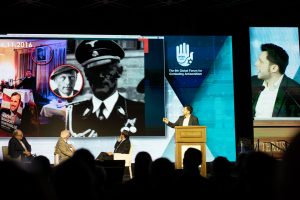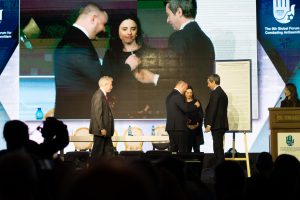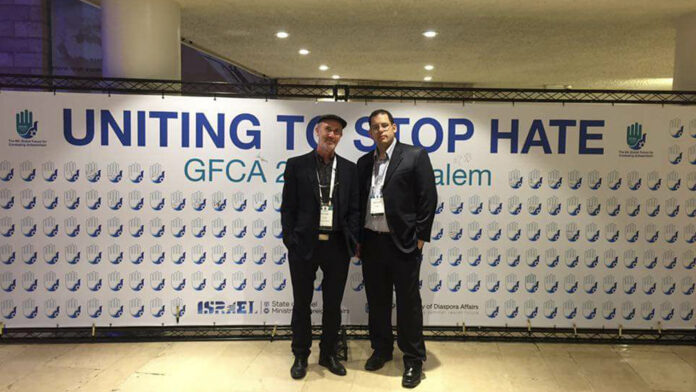1,200 participants from more than the 83 countries gathered in Jerusalem recently for the 6th Global Forum for Combating antisemitism. Several eminent speakers lamented the fact that the Forum had grown from small beginnings and antisemitism appeared to be a growth industry. Israel Institute of New Zealand Directors, Perry Trotter and Dr David Cumin were at the conference.
FOCUS ON EUROPE: FAR RIGHT, FAR LEFT, AND ISLAMIST ANTISEMITISM
Rabbi Andy Baker, Director of International Jewish Affairs of the American Jewish Committee, explained that in 1997 there was a conference in Strasbourg to plan for the future of European Jewry. At that time antisemitism was not a feature of the European experience and was considered to be fading into history. However, Europe only 21 years on seems a much different place.
One of the first surveys on antisemitism to be undertaken in 2013, found that 43% of European Jewry had experienced antisemitism over the previous 5 years and 77% said they didn’t report the incident. The most common reason given for lack of reporting was fear that police would not act. In 2018, 27% of European Jews reported feeling unsafe in their home cities. And given what was discussed at the Forum, it is uncomfortably easy to to see why.
A disturbing trend in Central and Eastern Europe is the rise of nationalist groups following the disintegration of the Soviet Union. As nations have sought to reclaim their history, revisionism has taken hold in order to facilitate national pride. The recent Polish law forbidding mention of Polish culpability in the Holocaust is one such example. Another is the Prague Declaration on European Conscience and Communism (2008), which established the European Day of Remembrance for Victims of Stalinism and Nazism. While this commemoration rightly acknowledges the millions of victims of Stalinism, it also minimises the genocide of the Jews, who were specifically targeted by the Nazi regime for annihilation as a whole group. This kind of Holocaust distortion feeds and is a form of antisemitism as per the IHRA working definition (see below).

Evidence was presented at the Global Forum by a representative from Austria that showed how almost one third of the current government is made up of The Austrian Freedom Party (FPÖ). Twenty out of the fifty four FPÖ MPs are also members of right-wing antisemitic fraternities who, in 2018, sing songs with lyrics including
“Step on the gas you old Germans, we’ll manage the seventh million”.Lyrics sung in Austrian Fraternities, whose members include Austrian MPs [in 2018]
The confronting presentation came with a public expression of fear from Ariel Muzicant, the honorary president of the Austrian Jewish community, that Israel may put realpolitik ahead of values and engage with FPÖ rather than follow the lead of the local Jewish community, who have said they will “not take up any political contacts with FPÖ representatives…”
Shortly after the Global Forum, Jews marched in the street against political leaders in the United Kingdom. Not neo-Nazi leaders but extreme left politicians – particularly Labour leader, Jeremy Corbyn – who has turned a blind eye to or engaged in blatant antisemitism over an extended period of time. Jew hatred is not confined to the Socialists of old or the neo-Nazis today; it is a disease on the extremes of both traditional political poles. While the songs of the far right are classic examples of Jew hatred, antisemitism of the extreme left has usually been of the new kind – the demonisation, delegitimisation, and double standards applied to the Jewish state.
Natan Sharansky, outgoing Jewish Agency chairman, was the keynote for the plenary session on Antisemitism and the Rise of Far Right Politics in Europe and underscored the sentiment of Austrian Jewish leaders in an aphorism of our time:
“Those who love Jews but hate Israel cannot be our friends; those who love Israel but hate Jews are also our enemies.”Natan Sharansky
However, the dangers of the extreme left and far right pale in comparison to the violent antisemitism of radical Islam. Accordingt o Abdullah Swalha, Director of the Centre for Israel Studies in Jordan, in Arab media, antisemitism is the second most popular topic after local and regional content and Iran plays a huge role in propagating every conceivable form of antisemitism and is a hub not only for antisemitism, but hatred against all minorities.
Representatives from France, with the continent’s largest Jewish population, spoke of their concern for physical security. They are less concerned about extreme left-wing or radical right-wing antisemitism and more concerned about the Jew-hatred violently expressed by the radical Muslims in the country. The 2006 kidnap and murder of Ilan Halimi, the 2012 murder of four at a Jewish school in Toulouse, and the murder of five at the Hypercacher kosher supermarket in 2015 were mentioned as watershed events. However, the recent murders of Sarah Halimi and Mirielle Knoll suggest there is still a lot of work to be done (beyond even displays of mass solidarity,that were seen in the wake of the Knoll murder) to keep the Jewish community from leaving in even greater numbers.
STANDING UP
The Charlottesville neo-Nazi chants of “Jews will not replace us” were also addressed at the conference by none other than the city’s mayor at the time, Mike Signer. Signer made headlines throughout the Charlottesville crisis with his forthright denouncements of the white supremacists invading his town and his humorous trolling of them on social media. And his message, born of experience, is that we must not be afraid to stand up against the hate and intimidation.
This was a message echoed in the Student and Young Leadership panel by Gilad Kabilo of StandWithUs whose challenges lie more on the Left than the Right. The intersectionality of the ‘Progressive Left’, a hot-bed of antisemitism, was addressed by one panel.
Their tactics were described by the Student Panel, who urged students to stand strong. Kabilo recalled an incident on a South African university campus where their Jewish/Israeli stall was overturned, posters ripped down, and Israeli flags torn. The Jewish and Israeli students retreated but in their debrief of the event resolved to return the next day and hold their ground, “even if it meant taking a punch”. Thankfully that was not needed but the shift in mindset was empowering and deterred the haters.
The European Union of Jewish Students President, Alina Bricman, also made a case for standing up rather than running away. She summed up the struggle of European students, saying they were [also]
“fighting three forms of antisemitism: from the extreme left, including BDS; from the extreme right, that is increasingly raising its head in Europe; and Islamist antisemitism.”Alina Bricman
With such committed and courageous young people, perhaps the prayer of Rabbi Abraham Cooper in his concluding remarks – that there be more leaders like former French Prime Minister, Manuel Valls – is already being answered.
Mr Valls gave a talk in which he continued his strong condemnation of antisemitism from the extreme right, extreme left, and Islamists. Valls repeated the statement he was praised for making in the days after the attack on the Kosher supermarket in Paris: “France without Jews is no longer France” and he added that “He who shouts ‘death to the Jews’ shouts ‘death to France’.” A similar statement was made after the conference by Sir Eric Pickles, a longtime warrior in the fight against antisemitism in the UK. Responding to a recent survey that found 30% of Brits agreed with at least one antisemitic statement, he said “without Jewish people, Britain would not tick properly“.
Such sentiments are as profound as they are simple. And yet, it seems only a few leaders truly appreciate how antisemitism is a harbinger of more widespread societal ills.
Perhaps, optimistically, it could be argued that elected officials have little in the way to guide them about what is and what is not antisemitic. One of the tools discussed at the conference that is helping many of the EU legislators better define antisemitism is the International Holocaust Remembrance Alliance (IHRA) working definition. This non-binding consensus definition has been adopted by 31 countries in an attempt to raise awareness of antisemitism, steer debate around the subject, and combat hate crimes against Jews.
And, once antisemitism is defined and identified, one of the ways to stand up to it is with education. There were sessions on countering antisemitism through E-learning, which featured the online courses offered by Yad Vashem and the programs offered by Fighting antisemitism Together, Canada.
HATE SPEECH AND HISTORY DENIAL
There was a fair amount of attention given to “hate speech” at the conference, particularly online hate speech – most of which comes in the form of the “new antisemitism“. A new tool was demonstrated at the conference which is able to quantify antisemitic activity and identify the most prolific posters.

The Ministers of Justice of Israel, Greece, Malta, and Italy signed a Joint Statement on Countering Online Hate Speech and Incitement to Violence and Terrorismin front of Facebook’s Policy Director for the Southern Africa, Middle East and Africa Region, Delphine Reyer. Israeli Minister of Justice, Ayelet Shaked, complimented Facebook’s engagement but said that Twitter was not cooperating with requests to remove inciteful material or terror posts and that Israel was considering legal action – a statement that subsequently saw Twitter stock price drop 12%.
The Joint Statement was carefully worded to address “illegal hate speech publications and the incitement and promotion of violence and terrorism”. However, what constitutes “illegal hate speech” depends on the jurisdiction. The most absurd example of this is the Armenian Genocide – it is illegal in Turkey to utter those words, whereas it is illegal in France to not refer to it as a genocide.
There was no powerful argument for curtailing free expression other than that which amounts to incitement to violence. There was also no discussion about the apparent double standards in the application of “community standards” by social media providers. However, the need to combat institutional history denial and double standards at the United Nations, where the Organisation of Islamic Cooperation block dominates the agenda was addressed.
Shimon Samuels, Director for International Relations at the Simon Wiesenthal Center, described the United Nations as an AirBnB – “full of hot Air, voting blocks that cater to the lowest common denominator, and bartering of votes”.
David Roet, former Deputy Permanent Representative of Israel to the United Nations, recalled being told that the 2014 attack at the Jewish museum in Belgium could not be called antisemitic because “‘antisemitism’ is not agreed language at the UN”. He described this as his “darkest hour”.
The “agreed language” also seemed to ignore Jewish ties to the Temple Mount – Judaism’s holiest site – in a series of UNESCO resolutions. The former Director General of UNESCO, Irina Bokova, repeated her criticisms of the organisation she led, saying
“To deny, conceal or erase any of the Jewish, Christian or Muslim traditions undermines the integrity of the [Temple Mount] site, and runs counter to the reasons that justified its inscription on the UNESCO World Heritage list.”Irina Bokova
SUMMARY
It has been encouraging to see so many people, especially non-Jews, take to the streets in protest over the latest antisemitic murder in France, the ongoing antisemitism of the UK Labour Party, and the rise of neo-Nazis in the USA. However, that there is a need for such outcry is deeply troubling.
It is also most concerning to see minimisation of antisemitism on the far left by the far right, and vice versa, as well as attempts to shut down any criticism of extreme Islam and the antisemitism within.
It is unique for a group of people to be hated by both political extremes. United Nations Secretary-General António Guterres has said that “History keeps moving forward, but antisemitism keeps coming back.” Whether that be in the form of classic tropes or in the newest mutation where the Jewish state replaces the Jewish people as a target, antisemitism continues. It is incumbent on us all to stand firm and seek for it to be combatted.
While the Global Forum was light on tactics and strategies, it was heavy on interest and energy. There is no doubt that a 7th conference will be required and we can only hope that it will not be quickly followed by a need for mass protests in European centres.
[FB_IINZcomments]



